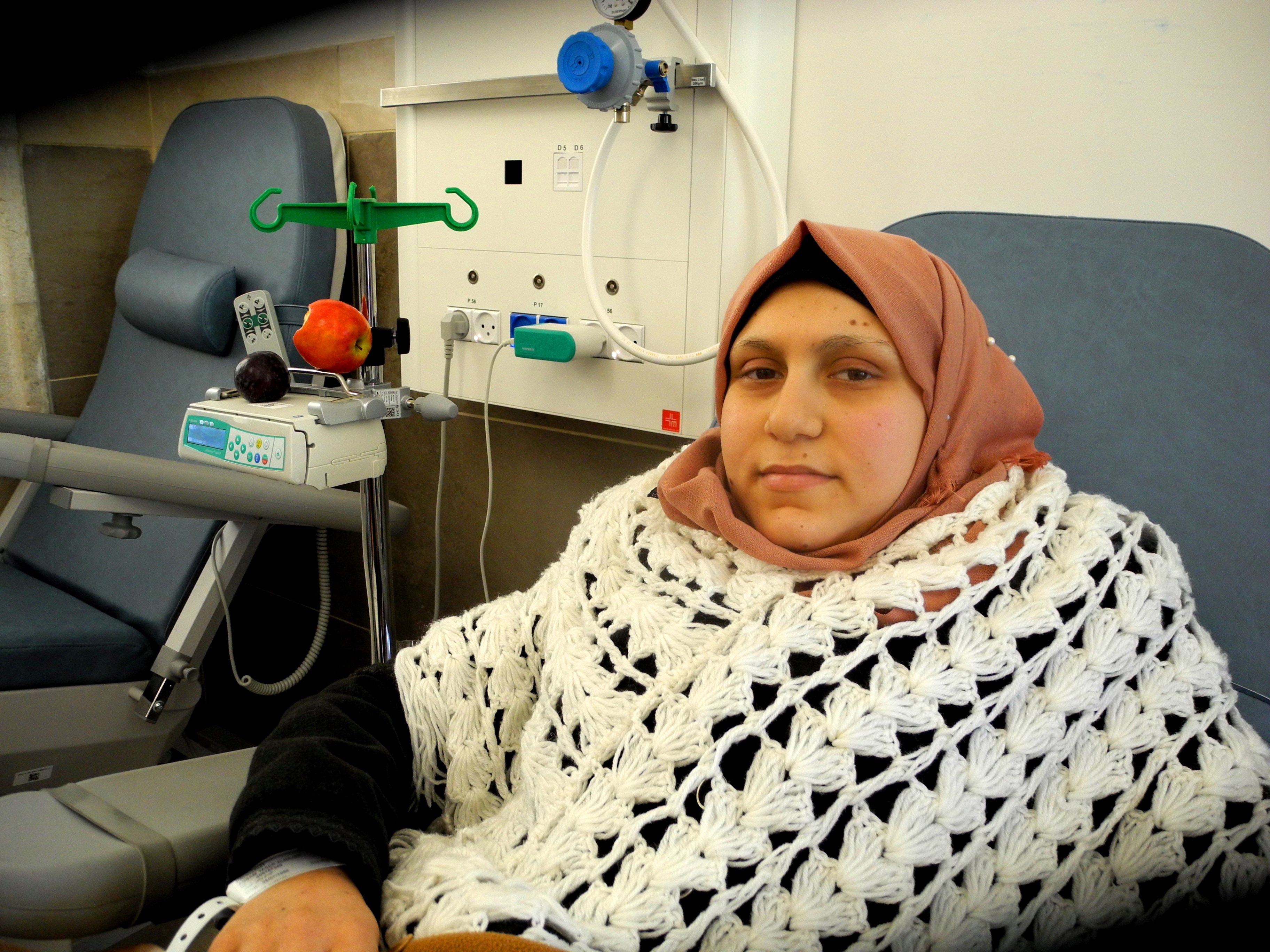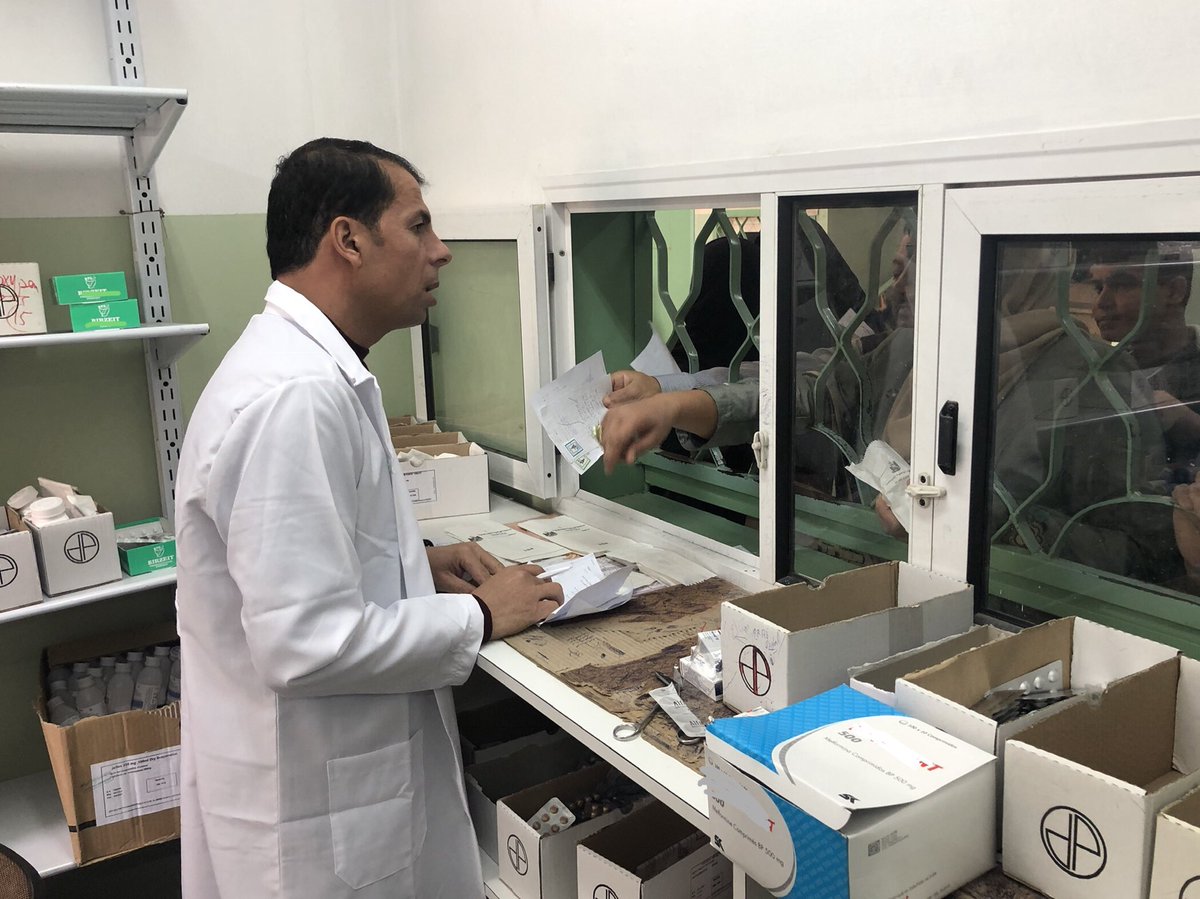WHO calls for sustainable solution to health sector power shortages in Gaza
8 February, 2018, Gaza Strip – Gaza’s health sector was on the verge of collapse due to dwindling fuel supplies until the United Arab Emirates stepped in this week with a US$2 million grant to sustain hospital backup generators for critical health services. The donation will provide enough fuel to keep facilities running for several months.
“The UAE’s timely support will save lives, but a more sustainable solution is required to address the chronic fuel and power shortages in Gaza that leave health facilities consistently on the verge of closure,” says Dr. Gerald Rockenschaub, Head of WHO’s Office for West Bank and Gaza.
Daily power cuts of 12-16 hours currently affect 28 hospitals and 153 primary care facilities in the Gaza Strip. The Ministry of Health has been rationing fuel supplies since January, when UN supplies for backup generators in 14 public hospitals drastically declined.
Between late January and early February 2018, two hospitals were forced to shut down: Durrah Hospital serving a catchment area of 250 000 people, and Gaza Psychiatric Hospital, the only mental health hospital in Gaza. Beit Hanoun Hospital, a 63-bed hospital located in the northern Gaza, was also partially closed, with the Emergency Department functioning at minimal capacity.
Public hospitals in the Gaza Strip provide life-saving healthcare for 1715 patients every day – including 113 newborns, 100 patients in intensive care units, 702 patients requiring hemodialysis, 200 patients in need of surgery, 100 women in need of obstetric surgeries, and 500 patients in need of emergency care.
Hospitals in Gaza are already over-stretched, with a bed occupancy rate of over 90%. With the closure of some hospitals, the extra burden placed on the remaining hospitals in operation will further strain the delivery of services, including surgery, emergency departments, intensive care units and maternity services.
“WHO is working with the Ministry of Health to establish longer-term strategic solutions to Gaza’s fuel crisis through the use of solar power, and establishing a dedicated and sustainable grid supply to support Gaza’s essential hospitals,” says Dr Mahmoud Daher, Head of WHO’s sub-office in Gaza.
Under-resourced public hospitals also face severe shortages in medicines and medical supplies. In January 2018, 40% of the essential drugs were completely depleted. This includes drugs used in emergency departments and other critical units. WHO is distributing over US$1 million worth of medical equipment and procuring over US$ 1.2 million worth of medicines and disposables, but these will only be sufficient to meet the critical patient needs in Gaza for less than 3 weeks.
More than 1.27 million people in the Gaza Strip are in need of critical lifesaving health services in 2018. As part of the Humanitarian Response Plan for Gaza, US$3.12 million is required by WHO and health partners to ensure the continuity of life-saving health services this year.
Julianna Nassar
WHO Office for West Bank and Gaza
+ 972 54 717 9042
Challenging barriers to survival in the occupied Palestinian territory: World Cancer Day 2018
Ansam's Story
 Ansam is 19, married, with a one-year-old boy. At the age of 17, after the birth of her son, Ansam sought medical advice at the Indonesian Hospital about a lump on her left arm she had noticed during her pregnancy that had started to cause her pain. She underwent surgery in Gaza to remove the lump and was told that it was cancerous. She was then referred to Al-Makassed Hospital in Jerusalem for further investigations and to decide what treatment was needed.
Ansam is 19, married, with a one-year-old boy. At the age of 17, after the birth of her son, Ansam sought medical advice at the Indonesian Hospital about a lump on her left arm she had noticed during her pregnancy that had started to cause her pain. She underwent surgery in Gaza to remove the lump and was told that it was cancerous. She was then referred to Al-Makassed Hospital in Jerusalem for further investigations and to decide what treatment was needed.
Because of the ongoing blockade of the Gaza Strip, Ansam then had to apply for a security permit to exit Gaza. She first applied for an appointment on 8 February 2016, and after repeated unsuccessful applications she was finally granted a permit to travel for health care 9 months later on 7 November 2016.
In September 2016, Ansam started her final year in school. Ansam remembers this time of waiting: “I was not worried about my health, but I was anxious about getting a permit. The paper work we had to do for the referrals was complicated, we had to jump from one office to another. My mother, my father and my husband were all rejected when they applied to accompany me out of Gaza. Only my grandmother got approval to come with me.” Male relatives under 55 years of age and female relatives under 45 years face additional security checks to be able to accompany patients for health care.
On 7 November, Ansam and her grandmother started their journey to Al-Makassed Hospital, where they stayed for 12 days for investigations. The doctors found recurrence of the cancer in her arm. She had further surgery, and was subsequently told that the cancer had spread to her bones. She was referred to Augusta Victoria Hospital in Jerusalem to undergo chemotherapy and radiotherapy. After her first round of chemotherapy, Ansam and her grandmother went back to Gaza. The journey was very difficult, as she had severe stomach ache and blurred vision. Each round of chemotherapy takes its toll: “I have to come to Augusta Victoria Hospital every month for 5 days, and my referral gets renewed monthly. It makes me so stressed to know that my applications for referral might get postponed or rejected at any point.”
Ansam is not receiving psychosocial support at the hospital, but she finds support in her son, her grandmother and her family in Gaza. Ansam feels comfortable at Augusta Victoria Hospital and appreciates the friendliness and efforts of the staff: “I get my support from my family, especially my son. Having him around me means the world to me. I feel more down in Jerusalem, because I am far from my family, and they can’t be next to me, but my grandmother and the hospital crew help me.”
Mosab's story
 Mosab is 20 years old from Hebron and has worked at his cousin’s butcher shop from the age of 16. In September 2017, Mosab was diagnosed with throat cancer
Mosab is 20 years old from Hebron and has worked at his cousin’s butcher shop from the age of 16. In September 2017, Mosab was diagnosed with throat cancer
Mosab recalls the moment he was told he had cancer: “Honestly, I thought I will die soon. In my mind cancer was equivalent to death. Because three years ago, my very good friend died from cancer and his father was an oncologist. So imagine, if he wasn’t able to save his own son I was sure that no doctor could save me.”
After his diagnosis, Mosab and his mother travelled to Jordan to the King Hussein Cancer Center, because they thought that treatment in Jordan would be preferable. They stayed for two weeks and Mosab underwent further investigations. The family paid 12,000 Dinars for the tests, after which the family had no more money left. Mosab left Jordan depressed. He felt he couldn’t eat, sleep or see anyone.
Doctors in Hebron urged Mosab to consider treatment at Augusta Victoria Hospital, stating that the hospital is of an excellent standard and free of charge since the Palestinian Authority covers the treatment costs of cancer patients. The hospital in Hebron initiated an urgent referral to Augusta Victoria, and Israeli authorities responded the next day with a one day permit for Mosab and his mother. At Augusta Victoria, the doctors reviewed the investigation results from Jordan and recommended him to start treatment the next day.
Augusta Victoria Hospital then applied for an urgent 3-month Israeli permit which was rejected, claiming that Mosab was misusing the permit system and faking his illness to get a permit to enter Israel. When the family informed the doctor at Augusta Victoria, the doctor went to the Coordination Office and managed to secure a 3-month permit for Mosab and his mother.
Mosab is undergoing eight chemotherapy cycles and 35 radiation sessions. He has to be in the hospital 5 days a week from morning until afternoon, and will have his last session in April.Mosab’s permit expires this month and he is anxious about the possibility of another denial. “I can’t wait to get this over with. I feel so bad for my Mum, who has to leave my one year old brother at home and stay with me all the time in hospital. I see her crying. Her suffering doubles my pain, I just want to see her happy again.”
Mosab appreciates the efforts and the kindness of the hospital staff: “I became friends with most of the nurses and doctors around me. Some of them join me for coffee after my radiation sessions. Sometimes I sleep at the hospital if I have multiple chemotherapy cycles. Of course I’d rather be home, but I also started to like the hospital. My main support is my friends. They visit me often and I feel that they care about me. This gives me strength.”








